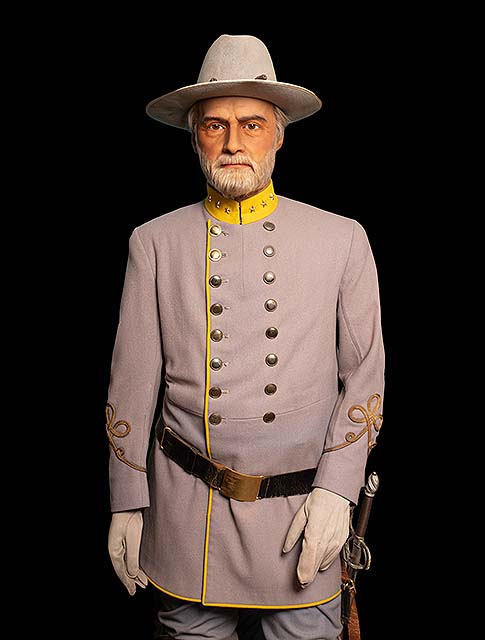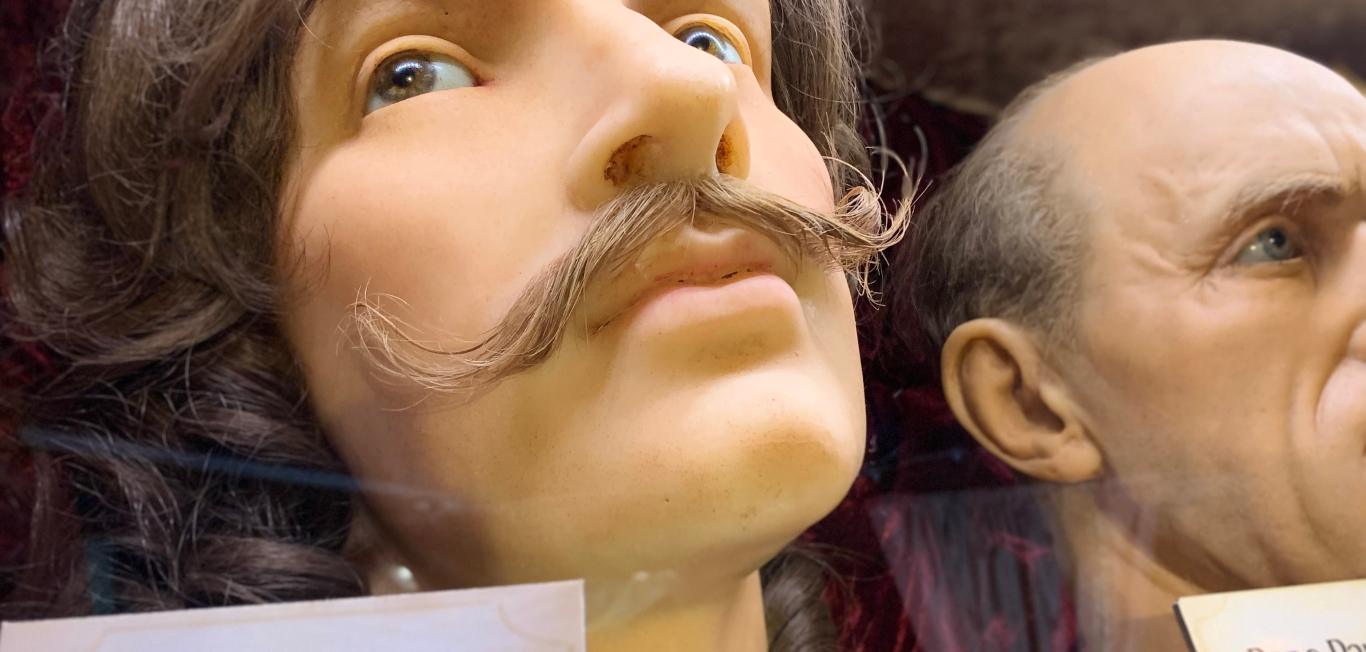History of Robert E. Lee
According to Civil War history, Robert Edward Lee, often referred to as “Robert E. Lee” was a prominent figure within the Confederate Army. Henry “Light Horse Harry” Lee III, a Revolutionary War officer, was his father. Owing to unsuccessful investments, Lee’s father experienced major financial setbacks and was imprisoned for debt. After his father’s release, the family quickly relocated to Alexandria, which at the time was still a part of the District of Columbia (annexed by Virginia in 1847). They did this for two reasons: first, there were top-notch schools there, and second, several extended family members lived nearby. Lee’s father permanently relocated to the West Indies in 1812, leaving his family to live on Oronoco Street. Lee was raised as a devout Christian, yet it took him till the age of 46 to be confirmed in the Episcopal Church.
Although Robert E. Lee owned numerous slaves, he opposed slavery philosophically but supported its constitutionality. Lee made the decision to join his home state when Virginia announced its intention to leave the Union in 1861. He participated in small combat engagements and served as Jefferson Davis‘ top military advisor throughout the first year of the Civil War. Robert E. Lee served as a general and was later promoted to Overall Commander of the Confederate States Army. During his military career, Robert E. Lee had many accomplishments. He received multiple commendations for bravery and competence in the Mexican-American War as a military officer. However, slavery and the Confederacy would later tarnish Lee’s legacy.
DID YOU KNOW?
Lee received multiple commendations for bravery and competence in the Mexican-American War.
Interesting Facts About Robert E. Lee
Revolutionary War hero Harry Lee, aka “Light Horse,” welcomed his son Robert to his aristocratic Virginian family in January 1807.
At West Point Military Academy, Lee excelled academically and placed second in his class behind Charles Mason, who later rose to the position of Chief Justice of the Iowa Territorial Supreme Court. Robert E. Lee’s accomplishments, motivation, concentration, height and good looks, earned him the nickname “Marble Model.” He completed the four-year program without receiving any demerits.
Robert E. Lee married the great-granddaughter of Martha Washington.
In 1829, not long after he completed his education, Lee began courting Mary Anna Randolph Custis, a distant cousin and childhood friend.
One of Robert E. Lee’s accomplishments included suppressing a slave revolt in just one hour.
According to Robert E. Lee’s biography, he turned down an offer for a Union leadership post.
Although Robert E. Lee is frequently regarded to have opposed slavery, he, unlike other White Southerners, never outright condemned it. He openly criticized abolitionists.
From 1865 until his passing, Robert E. Lee was president of Washington College (now Washington and Lee University) in Virginia. His reputation made it possible for the school to raise a lot of money, turning it into a premier Southern university.
During Lee’s life, he was never pardoned and did not have his citizenship.
Where Arlington National Cemetery lays today was previously where Robert E. Lee’s family resided before the war.
Early Life of
Robert E. Lee
Lee was the youngest son. After his father died, when he was six, Lee’s mother raised him. Young Robert was well-educated. He attended private schools in Virginia and abroad as an affluent child. In 1825, Robert E. Lee began studying at West Point. He graduated second in his class in 1829. For 30 years, Lee served as a U.S. Army colonel. In the Mexican-American War, he earned three brevet promotions for valor in action as a staff officer under General Winfield Scott. Following the Harpers Ferry armory raid, he headed U.S. Marines to apprehend abolitionist John Brown.
DID YOU KNOW?
Lee attended private schools in Virginia and abroad as an affluent child.
He became West Point’s superintendent in 1852 and updated the school’s curriculum and training procedures. He was granted command of the Union Army in 1861 by President Abraham Lincoln. However, he declined, claiming his allegiance to Virginia. Instead, he joined the Confederate Army and climbed fast to command the Northern Virginia Army.
In 1861, Lee debated secession despite his military victories. He resigned from his U.S. commission in command of the Union Army and joined the Confederacy. He led the Northern Virginia Army as a Confederate general. He was victorious at the Second Battle of Bull Run, Fredericksburg, and Chancellorsville as commander. In the Battle of Gettysburg, he commanded a disastrous assault on Cemetery Ridge, which turned the war. Andrew Johnson pardoned him after the Civil War. He was named President of Washington College in Lexington, Virginia, where he served from 1865 until his death. He is credited with rebuilding the school and teaching his pupils duty and dignity. He died after a stroke at 63 on October 12, 1870.
Accomplishments of Robert E. Lee
Robert E. Lee was recognized as a national war hero after he battled and defeated numerous Mexican armies and made significant contributions to U.S. territory gains that aided in westward expansion and boosted American dominance in the world.
He was given the enormous burden of proving his importance as a leader while serving in the U.S. military. He used his expertise to lead soldiers into bloody battles against stronger armies during the Civil War.
Lee led the Confederates to victory in numerous engagements over the course of his lengthy career as a general, displaying incredible bravery and savagery in the face of overwhelming odds against the South. He managed to remain a very worthy opponent against the North during the Civil War.
Hall of Fame
In 1936, Robert E. Lee entered the Great Americans Hall of Fame (HOF) after 70 years. Bronx Community College’s HOF honors Americans who have made major contributions to American history and culture with bronze busts. Lee’s HOF membership was controversial due to his ties to the Confederacy and slavery, but he was honored for his military leadership and strategic acumen.
DID YOU KNOW?
Lee was honored for his military leadership and strategic acumen.
Descendants of Robert E. Lee
Robert E. Lee married Mary Anna Custis Lee. They had three boys and four girls. George Washington Custis Lee, their oldest son, became a Confederate commander like his father. Lee was Washington University’s president from 1865 until 1877. Their second son, William Henry Fitzhugh Lee, was a major Confederate general. He governed Virginia from 1886 to 1890 after the war. Robert E. Lee Jr., their youngest son, edited the Richmond Times-Dispatch for years as a lawyer and writer. He helped preserve his father’s legacy. Mary, Agnes and Mildred, Lee’s daughters, also contributed to society. Mary, a loving wife and mother, helped her father in his later years. Agnes’ art and writing honored her father’s life. Mildred’s faith and positivity inspired people despite her severe rheumatoid disease. There are many descendants of Robert E. Lee in the U.S. Several works in education, the arts and other sectors commemorate him and his family.
Robert E. Lee’s life was full of victory and sorrow. He is still revered and inspires generations of Americans. Lee’s services to the nation should not be forgotten despite his ties to the Confederacy and the dispute between his life and his beliefs. As a soldier, professor and leader, he epitomized the finest American character and remains a vital component in the pursuit of a perfect union.
Late in Life
On April 9, 1865, he surrendered to Ulysses S. Grant, hence leading to the culmination of the Civil War. Lee surrendered for many reasons. After years of fighting, his army was exhausted. Second, Lee knew the Confederates needed food, ammo and equipment to battle. Finally, Lee realized that prolonging the war would only hurt his men and civilians. After the capitulation, Northerners and Southerners praised Lee’s honorable surrender. His determination to put the country before himself helped heal some of the war’s terrible wounds. Robert E. Lee is difficult and important in American history. Notwithstanding his dubious legacy, his military and national contributions are unquestionable.
Lee faced several obstacles after the Civil War. He worked extensively to revamp the school’s curriculum and infrastructure. Notwithstanding his achievements, Lee’s reputation was muddied by his support of the Confederacy and slavery. Lee’s portrait has become a flashpoint in Civil War legacy and racial justice arguments.
It was inevitable that Robert E. Lee had to start over after the war. He worked hard to create Washington College in Lexington, Virginia, one of the South’s premier universities, where he served as president. Lee developed cardiac issues in the late 1860s and later died from them. Despite his worsening health, Lee served at the institution until his death in 1870.
DID YOU KNOW?
Lee became Washington College’s president after struggling to find work.
FAQs
Who was Robert E. Lee?
Robert E. Lee was an accomplished leader in the United States Army. He fought for and led the Confederacy during the American Civil War and later surrendered to the Union.
How many slaves did Robert E. Lee own?
Robert E. Lee bought 200 enslaved people after inheriting several dozen from his father-in-law.
What did Robert E. Lee do in the Civil War?
During the American Civil War, Robert E. Lee led the Army of Northern Virginia, the most effective of the Southern troops, and eventually all the Confederate armies. Lee rose to prominence as the Confederacy’s military commander and a representation of the American South.
Why did Robert E. Lee surrender?
Lee surrendered for a number of reasons. The Confederate Army had been battling for years and was worn out. Furthermore, Lee was aware that the Confederates needed supplies, weapons and equipment to continue fighting. Lee finally saw that continuing the conflict would only harm his troops and citizens.










